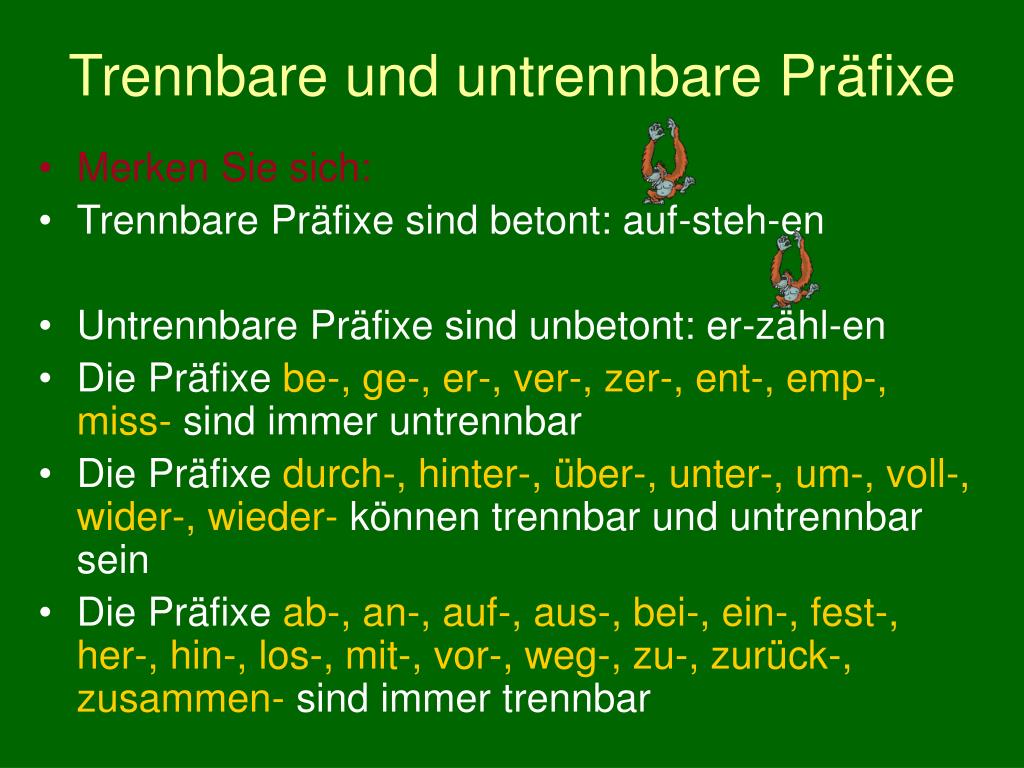Which Prefixes Are Separable in German?

Separable Prefixes in German. Like in many other European languages, German has many verbs with prefixes. But the difference in German is that many prefixes are separable, i.e. when conjugated, the prefix goes to the end of the sentence.
In this post I’m going to explain (1.) which prefixes are always separable (trennbare Verben), (2.) which prefixes are never separated from the verb and (3.) which can be both (and under what circumstance).
German Separable Verbs – How do They Work?
1. Separable Prefixes
The most common separable prefixes in German are: ab-, an-, (r)auf-, (r)aus-, bei-, (r)ein-, los-, mit-, nach-, her-, hin-, vor-, vorbei-, vorher-, weg-, zu-, zurück-, zusammen-.
The important fact about why these prefixes are separable is: they are stressed! Consequently, unstressed prefixes are not separable! It is very important to maintain the stress (bold in my examples) on the prefix even when separated from the verb. Examples:
- reingehen: Kommt ruhig rein, wenn ihr möchtet.
- zurückkommen: Morgen Abend um 8 Uhr kommen wir zurück.
There are other prefixes, used only with specific verbs, for example:
- leidtun (be sorry): Das tut mir wirklich sehr leid!
- wehtun (hurt): Tun dir deine Zähne schon lang weh?
- guttun (do good/benefit): Das wird ihr guttun!
- mittagessen/abendessen (have lunch/dinner): Wir haben gerade mittaggegessen.
What you should know about the separable prefixes:
- In the infinitive form, the verb has to be written always in one word, also when used with modal verbs: Kann ich morgen früh bei dir vorbeikommen?
- When used with a verb that needs zu, this particle has to go between the prefix and the basis verb, all written in one word: Du kannst ja versuchen, mal etwas früher aufzustehen.
- This happens also with the prefix ge- in Perfekt tense: Ich bin schon lange nicht mehr abends ausgegangen.
- Seperable verbs are not separated when used in a subordinate sentence: Ich möchte, dass du besser zuhörst!
- Compound verbs with sein are always 2 words: zurück sein → Sie werden übermorgen zurück sein.
2. Inseparable Prefixes
These prefixes are never separated from the verb: be-, ge-, er-, ver-, zer-, ent-, emp-, miss-, hinter-, über-.
They are always unstressed, meaning that the stress is on the basis verb. Also: these verbs have never the prefix ge– in Perfekt (except they have it already in the infinitive like gehören, gefallen or gelingen). Examples:
- versuchen: Ich habe es sehr oft versucht, aber nicht geschafft.
- entnehmen: Das habe ich deinen Worten entnommen.
- zerreißen: Er zerriss den Vertrag vor meinen Augen!
There are some verbs whose prefix is stressed but it is not separable because it is none of the prefixes listed above: antworten, frühstücken, handhaben, staubsaugen.
3. Changing Prefixes
There are 8 prefixes that can belong to either group: durch-, über- (just one is separable: see below), um-, unter-, voll-, wider- (less used), wieder- (mostly stressed → separable).
NOTE: Depending on the stress (bold vowel), so that the verb is separable or not, the meaning of the verb changes!
In the following list, I show you 2 verbs for every prefix spelled equally but their meanings are different! This way you can see the importance of stressing the correct part of the word. ?
- durch-: durchfahren | durchfahren (durchfahren)
- über-: übersetzen | übersetzen (übersetzen)
- um-: umfahren | umfahren (umfahren)
- unter-: unterstellen | unterstellen (unterstellen)
- voll-: volltanken | vollenden
- wieder-: wiederholen | wiederholen (wiederholen)
- wider-: widerhallen | widersprechen
There is just one verb whose change of stress only affects the grammar (separation or not) but not the meaning





























